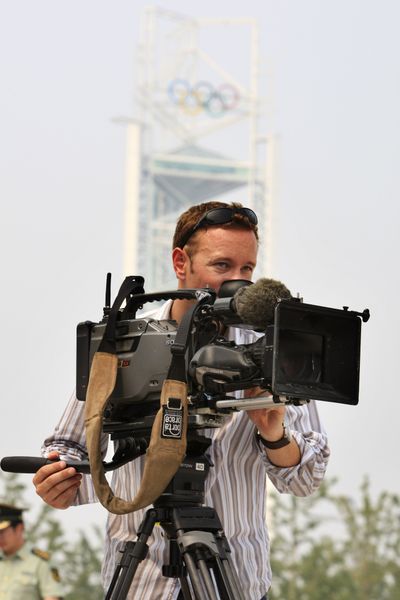Covering news beyond sports
Other networks face challenge of working around NBC’s broadcast rights during Olympics

NBC News could rent a small plane just for the top news personalities going to Beijing to cover the Olympics: Brian Williams, Tom Brokaw, Matt Lauer, Meredith Vieira, Ann Curry, Lester Holt, Richard Engel and Kevin Tibbles among them.
CBS considered sending Harry Smith, but decided against it and is sending Barry Peterson. Weekend anchor David Muir is ABC’s biggest name heading to Asia.
Dana Lewis is Fox News Channel’s lone representative. CNN is largely handling the story through its Beijing bureau, keeping frequent-flier Anderson Cooper at home.
Guess which network’s sports division paid nearly $900 million for the rights to televise the Olympics?
The rapid change occuring in China means there’s likely to be more news beyond sports in Beijing than most Olympics. Television news organizations face many challenges, including the decision of how much money and personnel they should devote to an event where NBC has the insider’s edge.
“It makes our lives difficult,” says Paul Friedman, senior vice president of CBS News. “But what we’ll do is what everyone in this situation does. You go and look for the stories around the Olympics that you can get access to and this time around they may be as interesting as the Olympics themselves.”
First, they must get to the stories. News organizations have complained for months about the difficulty in dealing with Chinese authorities unused to the concept of a free press. Several weeks ago a reporter from a German television station that had rights to the games had police stop a live interview on the Great Wall of China.
Broadcasters were given the commitment that they will be able to operate freely and without severe restrictions. Whether that will happen remains a mystery, says John Barton, director of sport for the Asia-Pacific Broadcasting Union.
As has often been the case in Chinese history, Tiananmen Square is a symbol. The Chinese first closed it to media, then said it will only be open for certain hours. Helicopters are banned from flying over the landmark to film the marathon.
NBC would like to see more openness, but is continuing discussions with Chinese authorities, says Dick Ebersol, chairman of NBC Universal Sports.
“China’s new to the world in terms of any level of openness,” Ebersol says. “It’s really a whole new thing for them. I clearly see in the seven years that we’ve been in business with them, I clearly see change. I think it’s a whole kind of learning experience for them.”
NBC’s biggest news presence will be on the “Today” show, which will bring its full team of Lauer, Vieira, Curry and Al Roker. The morning show will broadcast from the Olympic Green, which gives easy access to athletes, says Steve Capus, NBC News president, who will also be there.
Williams will anchor some “Nightly News” broadcasts from China and Brokaw will contribute historical vignettes. Because China is 12 hours ahead of the eastern U.S. time zone, Williams will do “Nightly” at dawn while “Today” is operating at sundown.
As a rights-holder, NBC is “uniquely positioned” to cover stories, Capus says. It’s not something new; the recent death of Jim McKay was a reminder of how ABC was best in place to cover the kidnapping and murder of Israeli athletes in 1972.
“We’re going to have access to certain areas that aren’t otherwise available,” he says. “That goes with the territory and we look forward to it.”
Besides those competitive disadvantages, rival networks have to decide how much time and money they want to spend covering Olympic games that are unfolding on NBC, effectively promoting a competitor. They won’t admit it, but that’s partly why other networks aren’t sending anywhere near the a-list talent or numbers that NBC is sending.
Judging from past Olympics, ABC News hasn’t been too hindered by other rightsholders in covering news events, says Chuck Lustig, the network’s director of foreign news coverage. There almost always turns out to be stories no one expects, like doping scandals.
Networks have used the games as a starting off point for other stories about China, says Jaime FlorCruz, Beijing bureau chief for CNN. The air quality problems in Beijing is one example; some athletes and officials are worried about this being a problem at the Olympics, giving reporters the chance to explore the consequences of unbridled growth.
ABC’s Bob Woodruff, who began his journalism career as a translator for CBS News during the Tiananmen Square uprising, is doing a documentary on China’s relationships with other countries. It will air Wednesday, two days before the Beijing opening ceremonies.